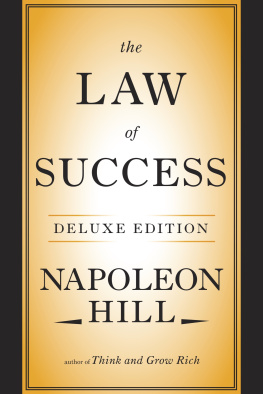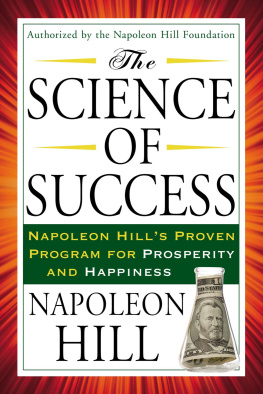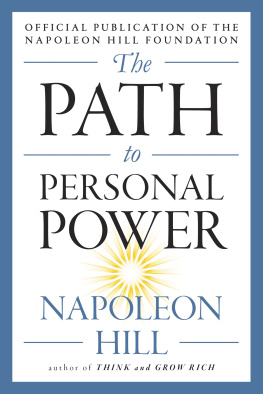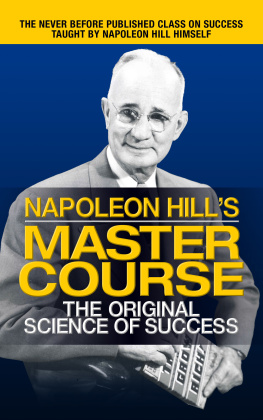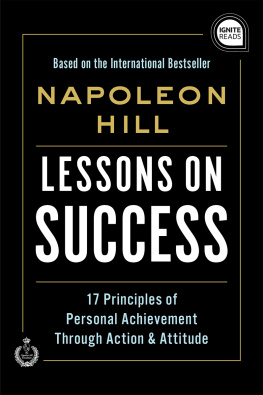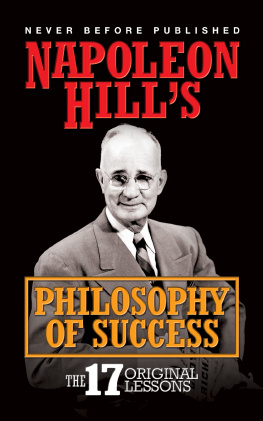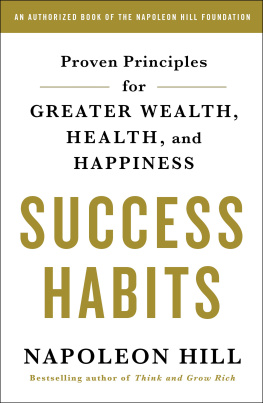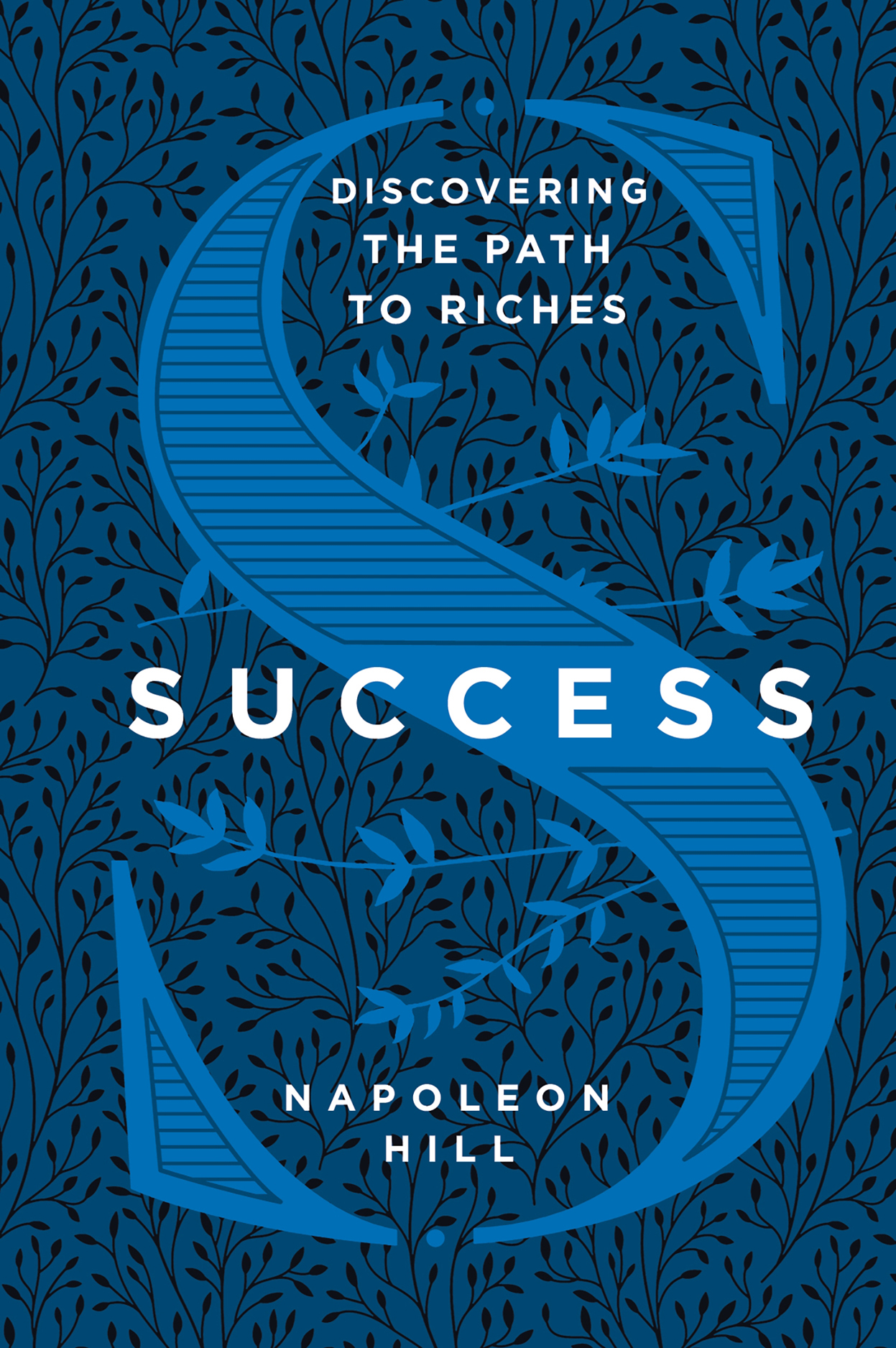Contents
Guide
Pagebreaks of the print version
The author and publisher have provided this e-book to you for your personal use only. You may not make this e-book publicly available in any way. Copyright infringement is against the law. If you believe the copy of this e-book you are reading infringes on the authors copyright, please notify the publisher at: us.macmillanusa.com/piracy.
ANYBODY can wish for riches, and most people do, but only a few know that a definite plan, plus a burning desire for wealth, are the only dependable means of accumulating wealth.
NAPOLEON HILL
Most of us are asking for success without the usual hardships that come with it. We want success with as little effort as possible.
I do not know what your definition of the term success is, but if I may impose my own definition on you, I would do so as follows:
Success is the sum total of ones acts and thoughts that have, on account of their positive, constructive nature, brought happiness and good cheer to the majority of those with whom one has been associated in the past and the majority of those with whom one will be thrown in contact in the coming years.
You cannot possibly bring happiness, good cheer, and sunshine into the lives of those with whom you associate and not enjoy success. Neither can you bring misery, despondency, and unhappiness to others and be a success.
If you cause other people to smile when you are near, if you carry with you the rich, vibrating, dynamic personality that causes people to be glad when you are near, if you speak and think of the beauties of life and persuade others to do the same, if you have eliminated cynicism, hatred, fear, and despondency from your own nature and filled their place with a wholesome love for humanity, then you are bound to be a success!
Money is not necessarily evidence of success. It may be, in fact, evidence of failure, and will be, if happiness and goodwill did not accompany it throughout the process through which it was accumulated.
I value more highly than all the material wealth in the world the pleasurethe thrilling joythat has come to me as the result of the opportunity I have had during the past years to serve my fellow man.
Could any amount of money buy happiness? NO! A thousand times, NO! Pleasure comes from doing and not acquiring. This is a lesson that some people never seem to learn, but it is a truth nevertheless.
The roadway to that thing we call success leads in one direction and that is straight through to the great field of human service. Any other road that leads in another direction cannot lead one to success.
I want to be happier this year than I was last year; not by acquiring more worldly goods, although I could use them to my advantage, but by serving others and by bringing greater happiness to the members of my immediate family and my personal friends.
If we cannot increase our measure of success in this manner, then we know not how to do so!
By no means do I recommend that anyone give up the pursuit of money as one means of finding success and happiness, but I strongly recommend that no one depend entirely upon the power of money for success and wealth.
I never have had enough money to cause me to quit trying to render service, but some who I know have had, and the result is not what I would call success.
Success in life produces wealth, but not the kind many think of; rather it is happiness and peace of mind that is derived by rendering service to others.
N APOLEON H ILL, 1920

Do you know that there is a big difference between an idle wish for the attainment of a definite object and a burning desire to attain it? Anybody can wish for things, and most people do, but only a few know how to desire so deeply that it turns into a flame of resolute determination.
N APOLEON H ILL
If you mention success, the majority of people believe that you are talking only about money. In fact, those individuals with a lot of money are considered by most to be successful people.
This little book on success will explore this aspect of success, which is made up of money and material possessions. However, this book will also focus on other, more important elements of success, such as family, friends, and good health.
When Ralston Society published Napoleon Hills classic book, Think and Grow Rich, in 1937, it was a hardcover book with a paper dust jacket. The original book cover contained the following phrase, For Men and Women Who Resent Poverty. However, in later publications, that phrase was removed and was replaced with the number of copies sold.
Part of the appeal of Think and Grow Rich comes from the title itself. At the time it was written, people across the country were experiencing the Great Depression and were looking for a way to make a living. Readers across the nation read Think and Grow Rich and it not only changed their financial situation, but also brought hope to a dismal time period. So, clearly, Napoleon Hill sought to teach his readers how to obtain material success. But he wanted them to obtain other measures of success as well.
Napoleon Hill spent a lifetime studying successful people to understand why some are successful and others are not. His interviews with more than five hundred of the most successful people of his time helped him answer that question. Additionally, Hill interviewed thousands of people he deemed unsuccessful. Hill often stated that he learned more from these unsuccessful individuals than he did from the successful ones.
After these many years of interviews and research, Napoleon Hill discovered that many successful people shared common traits and practiced the same principles. He used these principles to write his first book, The Law of Success, in 1928. The first publication of this book was an eight-volume set with each book containing two success principles.
Napoleon Hill called this material in The Law of Success a course created for the serious-minded individual who wanted to devote at least a portion of his or her time to learn how to succeed in life. He had two purposes in mind for this: to help students find their weaknesses and to create a plan that would provide the means to correct these weaknesses.
Some of the many weaknesses that inhibit us from being successful are:
- Greed
- Intolerance
- Jealousy
- Revenge
- Egotism
In order to obtain wealth of any kind, certain steps must be followed by any person. To begin with, a definite chief aim or major purpose must be established. This is a goal that you hope to achieve and it allows you to concentrate your talents and efforts on one task at a time. A definite major purpose also keeps you from wasting time and energy on useless projects. This was the second of the sixteen principles discussed in The Law of Success, and was a major focus of the book.
The fifteen other steps to success discussed in The Law of Success are listed below and will allow you to achieve any form of wealth you want from life.
The Master Mind Principle is the first one explained in The Law of Success,


